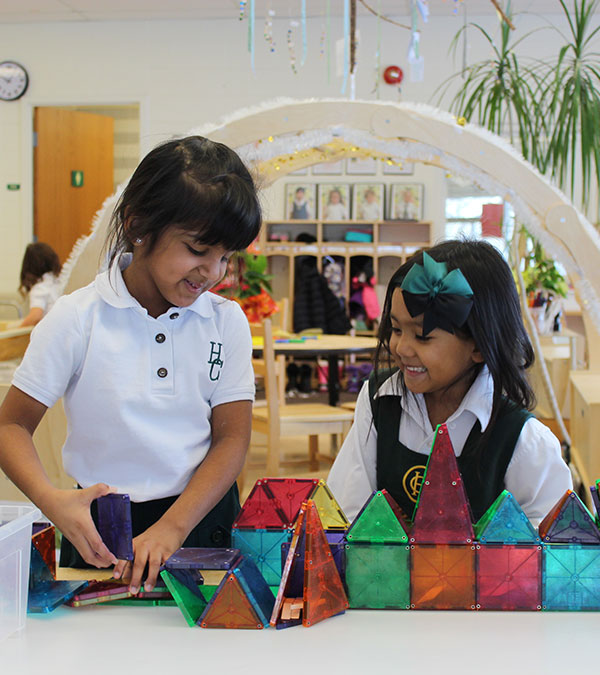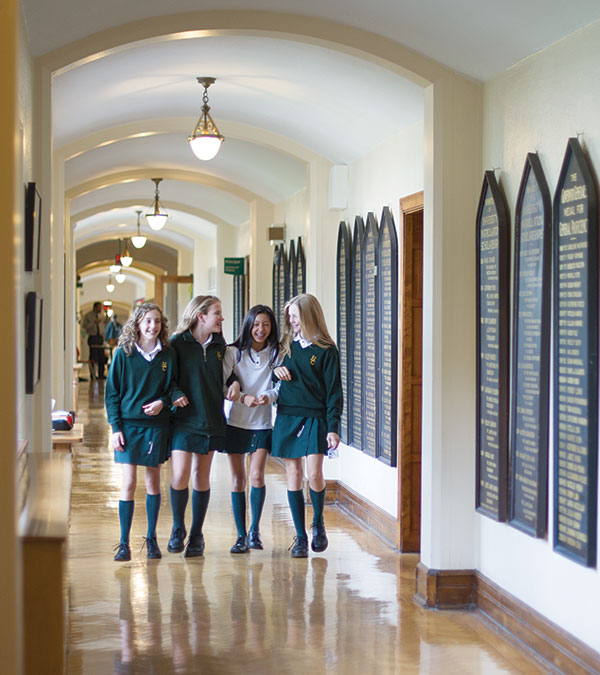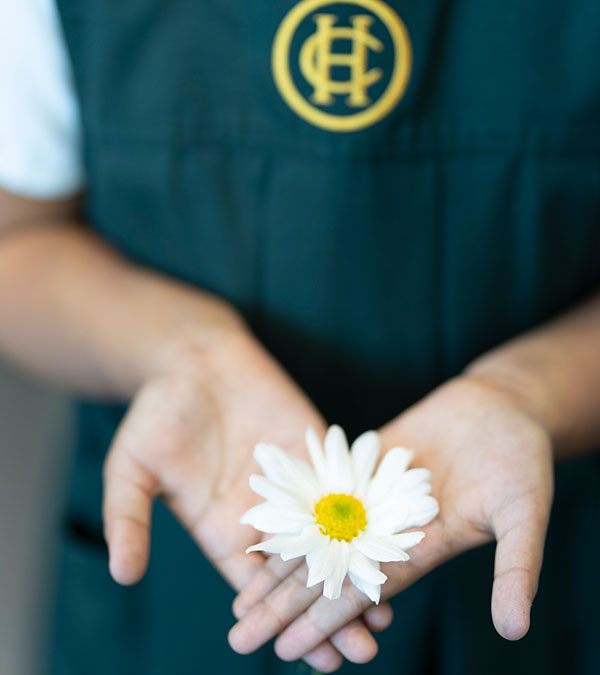Inside Havergal
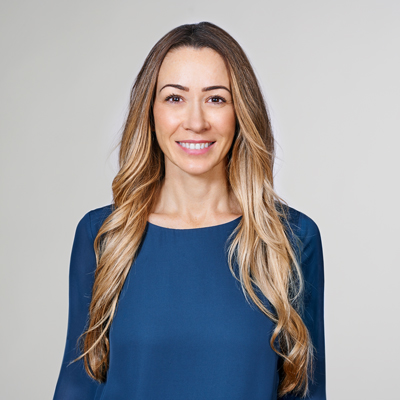
Principal’s Message
Dr. Katrina Samson
For decades, mental health had been studied from a deficit model, something to be “fixed” to get people back to status quo, versus being considered on a continuum, where we can take actions that will weaken or strengthen our mental wellbeing. Research has illustrated, however, that just like our physical health, there are ways to teach and practise strategies that will strengthen our mental health. At Havergal, we are working to learn, teach and embed a host of practices that are scientifically proven to improve wellbeing and build resilience in students, resilience that will serve them well when they encounter challenging periods, such as a heavy academic workload or an unfamiliar social situation.
Just like eating well, getting enough sleep and being active are actions we can take to strengthen our bodies, we can engage in concrete practices to strengthen our mental health. Our faculty and staff are learning about and teaching strategies from positive psychology such as: cultivating gratitude, understanding negativity bias and how to interrupt it, along with identifying and developing strengths, mindfulness and best-self visualization. These positive psychology interventions are part of an education model that recognizes that we can teach, learn and practise those skills that enable us to do good and feel well.
Focusing on health and wellbeing is paramount and necessary in order to realize our mission to inspire and equip young women to make a difference. Even if students study for a week and teachers prepare an engaging lesson, if our girls come to class fixated on mistakes, feeling highly anxious or tired, their brains are not primed to optimize what they are learning and they are not able to perform at their best or extract the same meaning from the content as when they are thriving.
Our approach to wellbeing education is intricately tied to students’ academic learning, and to cultivating an integrated, balanced school approach that emphasizes a liberal arts education to foster creativity, problem solving and rigour, while encouraging broad engagement. This approach helps us foster an appreciation for our strengths and the strengths of others. Our intentional approach to wellbeing is built into our timetables via weekly late starts, reflecting the unique neurological development in teens by building in flex blocks to prompt agency and autonomy, and to begin every morning with community time for connection and relationship building. Furthermore, when a student is struggling and needs direct support, we also have a team in place to respond, including grade-specific Guidance Counsellors, Social Workers, a nursing team, the school doctor, a Child and Youth Worker and Learning Support Specialists. This team of experts works alongside our team of teachers, advisors, the Heads of School and the Director of Wellbeing to support student wellbeing.
As parents, you know your daughters best. Our school-parent partnership works best when we communicate with one another the successes and challenges that our girls are encountering. How can you tell if your daughter needs extra attention and when should you reach out to the school? Maybe she tells you she doesn’t feel connected with her peers or perhaps she has a strong emotional response to something that didn’t previously bother her. These signals tell us it’s time to sit down to talk about how we can build emotional reserves, whether it’s finding an outlet, spotting their strengths or helping them process feelings in a way that doesn’t allow feelings to dictate response.
Throughout this issue of Inside Havergal, you’ll see in more depth some of the programming designed to support student wellbeing. In November, parents will hear more from us about wellbeing, including a summary of key learning from our wellbeing surveys done last spring and plans to expand and strengthen our support for students to ensure that every student thrives at Havergal.
Katrina
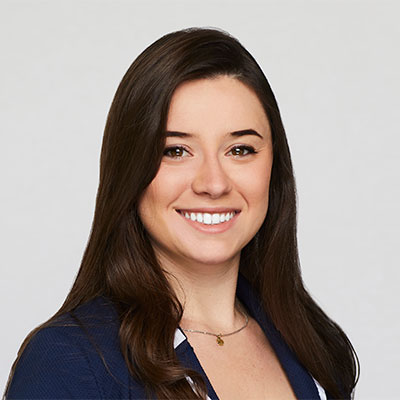
Message from the Board of Governors
Lexi Ensor 2013, Board Representative for HOGA
As an ex-officio member of the Board of Governors and Chair of the Havergal Old Girls Association Governance Committee, I am both proud and excited to represent the Old Girl/Alum community and help maintain the bond between our powerful, engaged and talented network of Old Girls/Alums to the school.
The mission of the Havergal Old Girls Association (HOGA) has remained the same since its inception decades ago: to keep Old Girls/Alums connected to the school and each other as we support the students who will one day become important members of our community. The goal has always been to build on the traditions from our strong history, while creating new and interesting ways to connect and engage. With over 9,500 graduates in more than 70 countries around the world, we are dedicated to creating programming that will sustain and support the lifelong associations between every Old Girl/Alum and the Havergal community.
We began this term with the biggest Reunion event in Havergal history! After a two year hiatus it was wonderful to welcome more than 600 Old Girls/Alums back on campus. The weekend began with our Hava Java station at Celebration Saturday where Old Girls/Alums were able to meet with former classmates and teachers over hot coffee and snacks. We set a new record at the Reunion Cocktail party with nearly 500 Old Girls/Alums in attendance. It was heartwarming to witness all the reminiscing amongst classmates and friends (view event photos). Finally, we welcomed all Old Girls/Alums who graduated 50+ years ago at the Cinquantenaire & Stoneagers Luncheon. It was an important day for those from the classes of 1960, 1961 and 1962 who were recognized for marking their 60 year reunion milestone and for the classes of 1970, 1971 and 1972 who marked their 50 year reunion milestone (view event photos). This special luncheon is always a highlight on the events calendar as it is an important recognition of our Old Girls’/Alums’ long-standing connection to Havergal and to the relationships that were formed at this school.
A note to the students: when you leave Havergal, you will always maintain an association to a powerful network with benefits that will last a lifetime. We look forward to keeping you connected beyond the ivy!
Should you have any questions concerning the work of HOGA, please feel free to contact me at [email protected].
Warmly,
Lexi Ensor 2013
This Month

Thank You for Your Support at CelSat 2022!
Our school community is proud to announce the total funds raised at Celebration Saturday in support of our community partnerships. Thank you to all of our guests, volunteers, students, faculty, staff and vendors for helping to raise $39,837.66 at this year’s event! These funds will help to make a difference for our community partners, including Art City, Water First, Youth Without Shelter, New Circles, North York Harvest Food Bank, Resources for Youth in India and Grenoble Homework Club. We look forward to continuing to strengthen our relationships with these organizations in a variety of ways. Thank you to our House Captains for sharing this important message with the Havergal community!
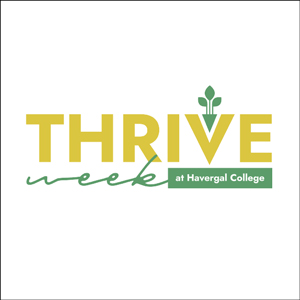
Thrive Week at Havergal
November 21 to 25
Thrive Week at Havergal College is a week-long series of events building a culture of wellbeing by promoting mental health awareness. It is one of many mental health literacy initiatives this year, where we are developing the capacity of our community to support and promote positive mental health. Programming includes a keynote speaker at the Upper School, student-run feel good activities across all grades and a special breakfast for our faculty and staff.
A highlight of Thrive Week will be visits from Sunshine Therapy Dogs on Monday, November 21 at the Junior School and Friday, November 25 at the Upper School. Pet therapy is a service that offers animal-assisted emotional support to people of all ages struggling with a variety of mental health challenges. “Comfort dogs” are great support for our wellbeing and our students will soon come to learn that their sweet demeanours will help them relax and replenish.
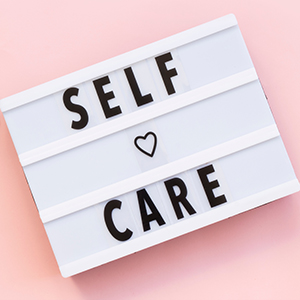
Self-Care: An Important Part of Supporting Academic Success
Caitlin Parsons, Senior School Social Worker
I have no time for that, I have more important things to do, it just takes away from the things I “should” be doing…
These are just some of the endless reasons, often expressed by students when asked if they practise self-care. In the fast-paced world we live in, where not taking a sick day is praised as demonstrating commitment to one’s career, can we really blame our kids for not practising self-care or even seeing the value in it? Especially when we often push our own needs to the side, in response to other demands? As a result, it is not surprising that “self-care” has become more of a buzzword than an actual practice and why more and more individuals find themselves exhausted and struggling with their wellbeing.
What is self-care and why is it important for our students?
Self-care is anything done deliberately to maintain emotional, mental and physical wellbeing. This can include exercising, eating healthily, getting enough sleep and engaging in activities that encourage a healthy, balanced relationship with oneself. However, balanced self-care is more than treating ourselves to a bubble bath or binging on Netflix over the weekend. It involves looking at what we need as a whole person—body, mind and soul—to feel refreshed and recharged on a consistent basis. Put simply, self-care is an important and necessary practice for everyone. When it comes to our students, self-care translates into a more focused, attentive approach to their academics. Students cannot give to their work what they don’t have for themselves.
Because self-care is one of the best ways to help manage stress, studies have shown that the students who practise it consistently report having lower academic stress and tend to perform better in school, compared to those who do not practise self-care. Not only can it help support academic success, but self-care can also help students to be the best version of themselves and cope with the stress that comes with balancing their studies, social needs and general day-to-day lives.
Role modeling self-care practices in our own lives and supporting students to incorporate practices that are “sustainable” in their own lives can be a great first step. So next time you are feeling overwhelmed, instead of trying to just plow through, try taking a pause and asking yourself: “what do I need right now?”
You might be surprised by how big a difference just a few small changes can make in your overall wellbeing.

Mental Health Literacy through Professional Development
Dr. Meagan Yarmey, Director of Wellbeing
Mental health literacy refers to the skills, understanding and knowledge that promote mental health and wellbeing and is a key competency we continue to develop in our community. In September, faculty engaged in mental health training on the 3Rs: “Recognize, Respond and Refer” to help increase our knowledge and skill set to better support student mental health. Our goal was twofold: to ensure our students receive timely, comprehensive support and that our entire community is comfortable recognizing signs of distress, responding with empathy and referring students to the appropriate resources.
A second area of professional development we’ve been focusing on this fall are interpersonal skills. The teaching-learning process in K to 12 classrooms is inherently interpersonal, encompassing teacher-student and peer connections. Given their social nature, classrooms can be an ideal context for teaching social skills such as active listening, collaboration and respect for others. Active listening involves listening, reacting and responding to another individual. It is a way of indicating that you understand what was said and that you’re genuinely interested in the speakers ideas, concerns and opinions. It involves giving them your undivided attention, withholding judgment and being mindful of your facial expressions and body language.
An interpersonal skill that can help us achieve this is the “GIVE” skill. Give is an acronym that stands for the following components:
G: (Be) Gentle—It is essential to be kind and respectful with your child; notice your tone of voice.
I: (Appear) Interested—Be sure to listen and appear interested in your child’s point of view, even if it differs from your point of view.
V: Validate—Validation is one of the most essential tools you can bring to your parenting. Words and actions show that you understand your child’s feelings and thoughts about a situation.
E: Have an Easy Manner—Smile and be light-hearted. Reflect on what you’re hearing in a kindhearted way and show compassion.
Intentionally using active listening and interpersonal effectiveness skills like GIVE helps to increase our students’ sense of psychological safety, creating environments where they are more willing and able to express concerns, ask questions and reach for help. We all want to be seen, valued and heard; these skills may help increase our ability to achieve this.

Learning Support at Havergal
Learning Support Team
At Havergal College, we recognize that everyone learns in different ways. Working in tandem with students, we aim to develop their self-knowledge as a learner, encourage confidence and nurture their agency. Students are encouraged to be their own person, challenge themselves and learn from experiences, making efforts to learn from mistakes and celebrate successes.
In conjunction with the school’s Guidance Counsellors, Social Workers, faculty and administrators, the Learning Support Team works to support a student’s identified areas of need—specifically working with students who have psycho-educational assessments and are experiencing academic challenges—to help them learn to understand and use their accommodations.
The Learning Support Specialists:
- help to identify students struggling with the academic demands of classes;
- implement strategies to meet the needs of identified students;
- identify and implement reasonable accommodations and interventions;
- review psycho-educational assessments;
- create Individual Education Plans (IEP) for students with identified learning needs, which identify annual goals and describe the accommodations available for that student;
- co-ordinate and lead meetings with teachers and families to discuss reasonable accommodations and recommendations;
- support the faculty in understanding the learning needs of their students;
- work collaboratively with faculty to develop programming within the classroom;
- review and maintain necessary documentation; and
- work one on one or in small groups with students.
In the Junior School, there are four Learning Support Specialists and one Child and Youth Worker who supports the social/emotional needs of students. This team is supervised by the Head of Junior School Learning Support.
There are two Middle School Guidance and Learning Support Specialists for students in Grades 7 to 8 and there is one Senior School Learning Support Specialist in Grades 9 to 12.
The goal at Havergal is to create a positive and nurturing school culture whereby students become self-advocates for themselves, with the support of a team of professionals to nurture and guide them as they navigate life.
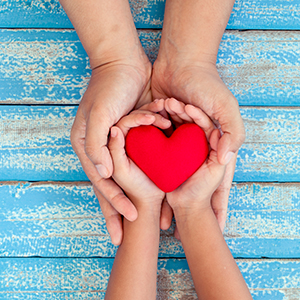
Emotions, Self-Regulation and Wellbeing at the Junior School
Junior School Educators Katie Tranter, Larissa McIntyre and Megan Robar
Now that the school year is well underway, wellbeing is taking many forms in the Junior School. Students engage in opportunities to name and notice feelings and emotions, develop strategies for self-regulation, attend to their health and wellbeing and much more. The three of us work in partnership with the Director of Wellbeing, Dr. Meagan Yarmey, and the Head of the Junior School, Ms. Kate White, on learning how to implement the renowned Yale University RULER approach. This program aims to help students understand the value of emotions, build the skills of emotional intelligence and create and maintain positive emotional climates. The goal of the training is to understand and implement this framework to support the Junior School Wellbeing Program at Havergal College in the coming months and years.
We’re looking forward to Thrive Week at the Junior School (November 21 to 25), which will include activities and conversations around the “Thrive Five”: physical activity, getting a good night’s sleep, eating well, giving back and connecting with others.
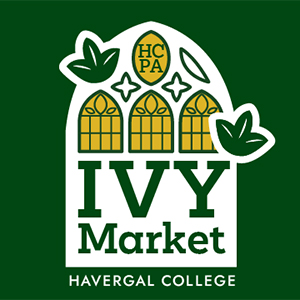
Ivy Market: Tickets on Sale Now
The countdown is on for the HCPA’s Ivy Market on Tuesday, November 22! This brand new event will feature daytime shopping for parents and students, with products from external vendors and HC alike—and will see the return of our always popular bake sale! Tickets for Ivy Market’s evening cocktail party, during which parents can shop and mingle, will go on sale soon. Don’t miss out, buy your tickets early!
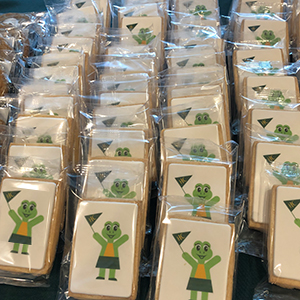
Bake Sale: Call for Volunteers
We’re pleased to announce that the HCPA’s sweetest fundraiser is back! The Bake Sale, popular with both students and parents, will take place on November 22 as part of Ivy Market. There will be sales at both the Junior School (during the day, for JS students only) and the Upper School (during the day and into the evening for US students and HC’s parent community).
More details will be shared soon—but in the meantime, we’re looking for volunteers for the following:
- Setting up and staffing at the Bake Sale (Junior School or Upper School).
- Baking and donating nut-free baked goods.
- Purchasing and donating nut-free baked goods (e.g., Amazing Donuts on Bathurst or Cakes by Robert or Sullivan and Bleeker, both available at Pusateri’s).
If you’re able to help, please sign up at:
Inside Focus
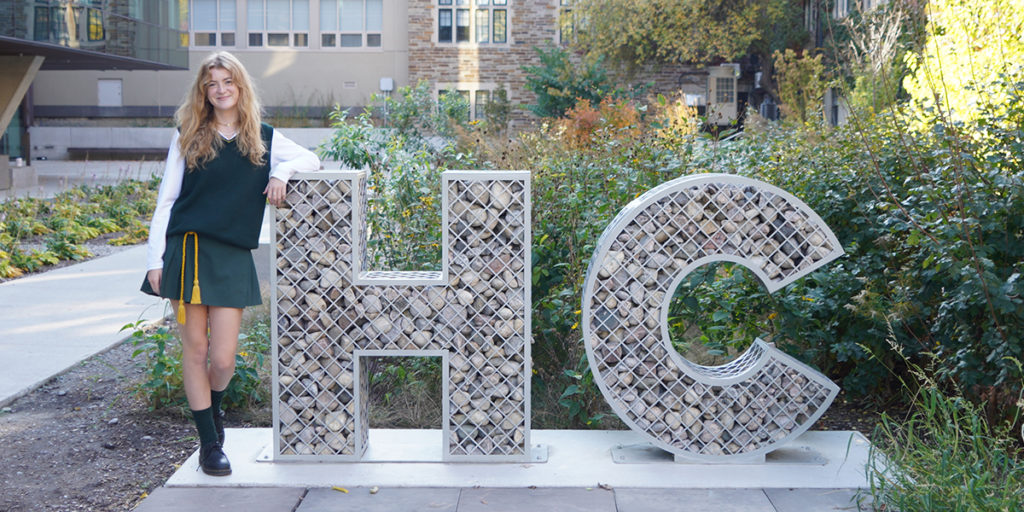
Message from the Wellbeing Prefect
Hi Havergal! I’m Maddy and I’m this year’s Wellbeing Prefect.
When I first started at Havergal in Grade 9, mental health was one of the greatest obstacles I faced. Although we have excellent wellbeing resources in place at the school, such as our social workers, Ms. Parsons and Ms. Waisglass, and Dr. Yarmey, our Director of Wellbeing, I found it difficult to come forward and connect for help until much later in my Havergal journey.
For me, it was a combination of stigma, timidity and a lack of awareness regarding the support available to me that prolonged my struggle.
As Wellbeing Prefect, my main goal is to encourage conversations on mental health issues throughout the student body, with a particular emphasis on students who might not feel as comfortable coming forward or as familiar with Havergal’s wellbeing resources. As we come out of the pandemic—a period which presented a myriad of challenges for all of us—it’s vital that we raise awareness of how we can best improve our wellbeing as individuals and as a community.
The first big wellbeing event this year is Thrive Week in late November, where we’ll hear from guest speakers, and students will facilitate important conversations on mental health and wellbeing at Havergal. Our theme this year is social connection, which presents an opportunity for students and faculty to reflect on how they can work to improve their wellbeing by taking advantage of the community support that surrounds them.
Additionally this year, we’ve assembled the Wellbeing Council, which consists of 10 students from Grades 7 to 12 who are working to integrate student voice into wellbeing programming at Havergal. Whether that’s helping to plan activities for Thrive Week, or gathering input from the student body, the Wellbeing Council will be an asset to encouraging important conversations on mental health and wellbeing at our school.
Moving forward, the Wellbeing Team (consisting of our social workers, Dr. Yarmey, the Wellbeing Council and myself), will work to break the stigma and raise awareness on mental health and wellbeing—but we can’t do it without the support of our community. From connecting someone close to you to wellbeing resources or simply starting a conversation, any small step will help make Havergal a place where everyone can thrive.
Meet Our Faculty & Staff
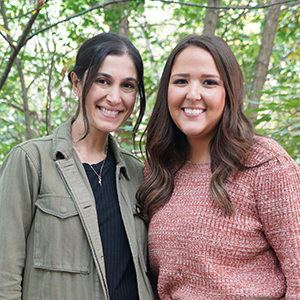
Introducing Our Newest Wellbeing Team Members
Nicole Waisglass, Middle School Social Worker, and Holly Fournier, Junior School Child and Youth Worker
Both new to the Wellbeing Team at Havergal are Holly Fournier, Junior School Child and Youth Worker, and Nicole Waisglass, Middle School Social Worker.
Ms. Waisglass joined Havergal College as the new Middle School Social Worker after specializing in adolescent mental health at Youthdale Treatment Centre. At Havergal, her role is to provide short-term counselling to optimize the social and emotional wellbeing of students in Grades 7 and 8. When most people think of a school social worker, they often think of someone who provides one-on-one counselling support to students who may be struggling. While this is certainly true and a large part of her role, Ms. Waisglass is a part of a team that provides support in other areas of school life. For example, she helps support and facilitate Middle School Form wellbeing programming and events, such as Thrive Week, Pink Shirt Day and Bell Let’s Talk Day, as well as the Wellbeing Club. As the dedicated Middle School Social Worker, her role consists of both frontline work and Wellbeing Program development pieces to help support and encourage positive mental health and wellbeing for our students. Ms. Waisglass holds a Master of Social Work degree from Wurzweiler School of Social Work (2019) in Manhattan, New York City. She is registered in good standing with the Ontario College of Social Workers and Social Service Workers and the Ontario Association of Social Worker.
Ms. Fournier is a passionate and caring Child and Youth Worker who completed her diploma at Centennial College in 2015 and developed her skills in a variety of academic settings. She began her career working as an Educational Assistant for the public school board before becoming a Child and Youth Counsellor, which enabled her to continue to support diverse groups of students at the public school board. Holly excels at crisis intervention, conflict resolution and student wellbeing. She has a strong ability to observe, identify and proactively address issues of social/emotional development and learning. Her strong communication skills have allowed her to work effectively with students, staff and family members to address concerns and provide helpful strategies. Ms. Fournier’s number one goal is to make sure every student who walks through her door has the opportunity to speak their truth and feel heard. During her first year at Havergal, she is excited to get to know the students and staff as she becomes a familiar face. She strives to gain the trust and respect of everyone in the community and she hopes that over time she will become a valuable resource that staff and students don’t have to think twice before reaching out to her.

